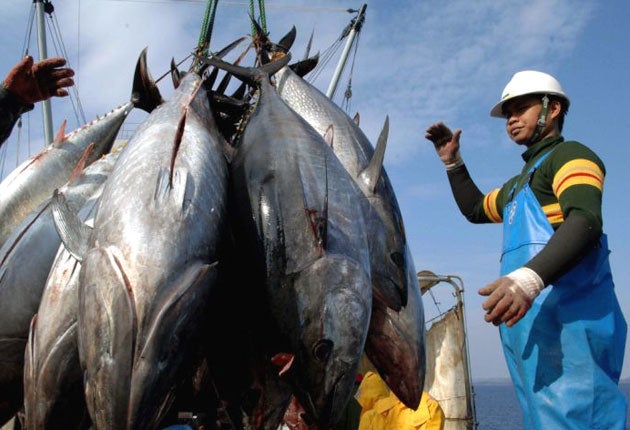Britain takes up tuna's cause
Government joins forces with France to press for global ban on sale of bluefin

Your support helps us to tell the story
From reproductive rights to climate change to Big Tech, The Independent is on the ground when the story is developing. Whether it's investigating the financials of Elon Musk's pro-Trump PAC or producing our latest documentary, 'The A Word', which shines a light on the American women fighting for reproductive rights, we know how important it is to parse out the facts from the messaging.
At such a critical moment in US history, we need reporters on the ground. Your donation allows us to keep sending journalists to speak to both sides of the story.
The Independent is trusted by Americans across the entire political spectrum. And unlike many other quality news outlets, we choose not to lock Americans out of our reporting and analysis with paywalls. We believe quality journalism should be available to everyone, paid for by those who can afford it.
Your support makes all the difference.Britain is to join France lobbying governments around the world for an international ban on the sale of the bluefin tuna, which is on the brink of extinction after years of over-fishing.
The fisheries minister Huw Irranca-Davies told The Independent the UK would back and seek support in Washington and other international capitals for a proposal to ban the fish at Cites (the Convention on the International Trade in Endangered Species).
France, which has a bigger bluefin fishing fleet than anyone else, also announced yesterday it would back a Cites ban, bringing a a real prospect that the fish – which will be wiped out in the Mediterranean by 2012, according to the World Wildlife Fund for Nature (WWF) – may be saved.
Speaking of the need to protect global fish stocks, French President Nicolas Sarkozy said: "Ours is the last generation with the ability to take action before it's too late."
Wildlife groups were elated at support for the ban, which would bypass management by the fisheries body in charge of the bluefin tuna, Iccat (International Commission for the Conservation of Atlantic Tunas), which has been roundly derided for its failure to protect the fish.
However it is almost certain to put the UK on a collision course with Japan, where bluefin is highly-prized as sushi and sashimi. A single fish can fetch $100,000 [£60,800] in Tokyo, making it the most expensive food on earth.
Motivated by the bounty, organised crime in Italy is believed to be involved in the Mediterranean fishery, which is believed to land 60,000 tons of bluefin a year, almost treble the legal catch and four times the amount recommended by scientists. Concern has grown this summer following the screening of the docu-film The End of the Line, which presented the bluefin as the starkest example of 21st Century over-fishing.
Nobu, the Japanese restaurant chain, attracted criticism for continuing to serve the fish at its eateries in London, despite acknowledging on its menu that it was a "vulnerable" and advising diners to choose an alternative.
Monaco, the tiny Mediterranean principality, has been privately canvassing support for a Cites ban during recent weeks. Speaking to The Independent, Mr Irranca-Davies said: "We've been in some discussions with Monaco to see how that proposal is progressing. Our biodversity unit has been talking with their counterparts in Monaco and other Cites member states – the US and Canada – to see whether there's any appetite for proposing this action and what form it might take.
"Now we've had sight of the proposals in the last day or so, I can confirm that the UK will support a Cites listing of bluefin tuna. We do think this is not a substitute for Iccat and the work it does, but we are pleased to give that proposal for Cites listing our strong support. We hope that others will come on board as well."
Providing it attracts sufficient support, Monaco will table its resolution by 17 October for Cites's meeting in Doha, in Qatar, in March. A ban – requiring a two-thirds majority – would take effect 90 days later, ending the annual summer bluefin hunt.
Asked whether he was braced for a fight with Japan, Mr Irranca-Davies said: "I don't think we need to get into a fight over this. There will be people for whom this bluefin tuna is important either as a consumer nation or as a fishing nation, but what we cannot get away from is the stark evidence that is staring us in the face."
Willie MacKenzie, Greenpeace oceans campaigner, said: "It's fantastic the UK is taking such a strong stance on bluefin by backing the listing on Cites, and it's one that an increasingly-aware British public will welcome. Not only does this show the UK's understanding of the severity of the problem, but it must compel other countries, notably the US, to follow suit. Bluefin tuna are the blue whales of our time, and have been relentlessly over-exploited for far too long."
"This iconic species has long disappeared from UK waters and we need to ensure the same does not happen in the Mediterranean," said Sally Bailey, marine programme manager at WWF, who praised the UK's "great step forward."
Charles Clover, author of the book The End of the Line, while also welcoming the action, said there was evidence that bluefin tuna of breeding age had already been fished out.
"France is one of the nations principally responsible for wiping it out," he said. "There are no mature spawners on the Japanese market. A third of the fish that are being sold are under the legal size."
"What's coming together now is that everybody knows there's no fish left in the sea. They probably caught them all in 2007, while we were filming it. This is Europe's great fisheries disaster."
Join our commenting forum
Join thought-provoking conversations, follow other Independent readers and see their replies
Comments